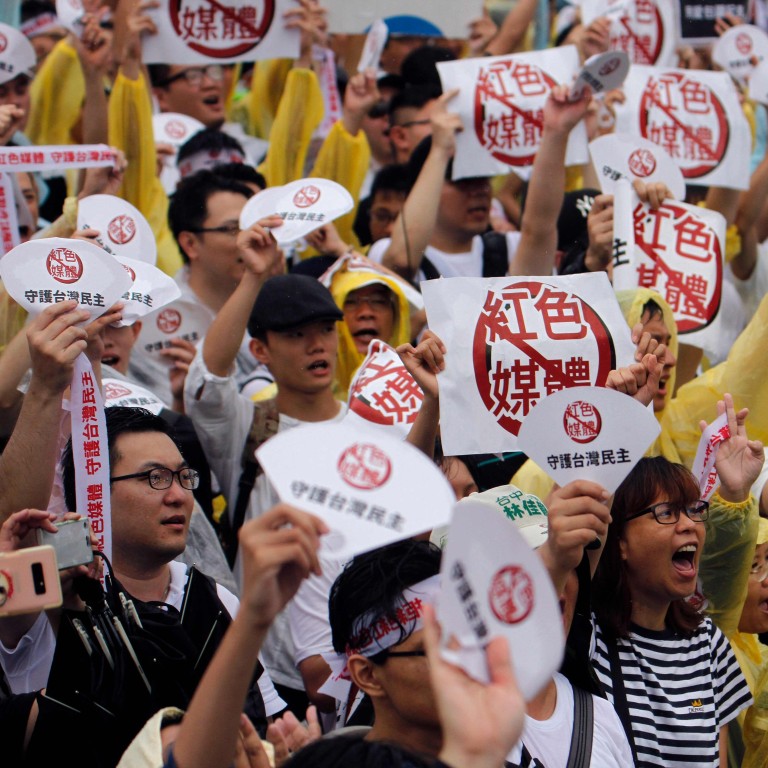
Taiwan set for pro-mainland fake news deluge before its presidential election
- Reports that mainland China rescued Taiwanese tourists stranded in Japan during typhoon were fake, but social media boosted their impact
- Police are probing false claims that the Taipei government funded Hong Kong protests
With a presidential election looming Taiwan is bracing for a deluge of fake news and disinformation – much of it emanating from mainland China and aimed at making sure Beijing’s preferred party wins the day, analysts say.
Torrential rain did little to put off tens of thousands of people rallying in Taipei on Sunday against what they have dubbed the “red media”.
The term is used to describe both legitimate news outlets and more opaque online sources that flood the democratic island with either pro-Beijing coverage or outright disinformation.
“I don’t want to see ‘red forces’ invading Taiwan to control the media and manipulate what people think, to fool the public,” Alan Chang, a 30-year-old businessman attending the rally, said.
Taiwan goes to the polls in January and the contest is set to be dominated by relations with the mainland.
The island has been self-ruled in charge of its own affairs and borders for the past 70 years.
But Beijing maintains that Taiwan is part of its territory and has never given up its threat to retake it, by force if necessary.
It has stopped communication with the government of President Tsai Ing-wen, who is seeking a second term, because she refuses to acknowledge the island is part of “one China”, while ramping up military drills and poaching Taiwan’s dwindling diplomatic allies.
Tsai’s main challenger is the Kuomintang, which favours much warmer ties with the Chinese mainland and is the party Beijing wants to see back in power.
“The stakes for the 2020 elections are high, as they will determine Taiwan’s future direction,” J Michael Cole, a Taipei-based expert at the University of Nottingham’s Taiwan Studies Programme, said, adding that fake news was already at “alarming levels”.
“So [Beijing] will intensify its influence operations – including fake news – to increase the odds that someone other than Tsai is elected,” he said.
Last week Tsai’s office also asked police to investigate false claims on social media that her government had given US$32 million to finance huge anti-government rallies in Hong Kong.
Hu Yuan-hui, head of the Fact Checking Centre in Taipei, said the viral nature of disinformation was being aided by many Taiwanese people using mainland Chinese social media and messaging services.
“They [fake reports] tend to highlight the contrast between Taiwan and China to try to portray a chaotic Taiwan versus a strong China,” he said.
But analysts said there was also a surge in fake news items ahead of those polls.
A study by Wang Tai-li, a journalism professor at National Taiwan University, found 54 per cent of people surveyed were unable to distinguish the fabricated report about mainland China evacuating people during the typhoon, which went viral ahead of the November vote.
“Disinformation campaigns were proven effective last year and they will be replicated in larger scale during the upcoming presidential election,” Wang said.
Taiwan’s bid to tackle ‘fake news’ raises fears over freedom of speech
Reporters Without Borders (RSF) said the false typhoon evacuation story originated on the Chinese mainland and was picked up by Taiwan’s social and traditional media, in a “carefully coordinated and extremely effective disinformation campaign”.
“Beijing has been targeting Taiwan with disinformation campaigns for decades … However, it is only recently that social networks have enabled these activities to have a viral impact,” RSF said.
US officials have also said Taiwan is “on the front lines” of Beijing’s disinformation campaigns.
“There is no question, at least in our minds, that China will try to meddle – they’ve done it in every previous election,” Randall Schriver, US assistant defence secretary for Asian and Pacific security affairs, said last week.

.png?itok=arIb17P0)